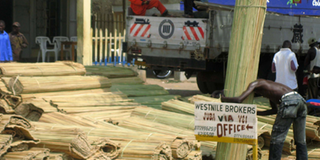Regional blocs threaten South Sudan market

Brokers load papyrus mats onto a truck at Juba stage along Rhino-camp road in Arua town recently. The lucrative trade between Uganda and South Sudan has attracted a horde of local entrepreneurs. FILE PHOTO
Uganda could soon be out competed in its biggest market in the region if it does not quickly join the free trade zones where its biggest competitor in the same market, Kenya, is already a member.
Kenya is already accruing the advantages of being in the same free trade zone with Sudan as Uganda’s products ‘gather dust’ on the shelves because they are generally considered expensive in relation to Kenya’s products that get subsidies from the Common Market for Eastern and Southern Africa (Comesa)free trade zone.
Both Kenya and Sudan are members of the Comesa free trade zones, meaning they can trade between each other with minimum or no restriction. This includes accessing each other’s market at a zero tariff, something that is not true for Uganda because it has not yet joined the Comesa free trade zone.
Local manufacturers are now concerned that if the state of affairs remain the same, Uganda’s advantage as the biggest traders with South Sudan will be no more.
In a June 21, 2010 letter, written by a former board member of the Uganda Manufacturer’s Association, fears are expressed, which include among others losing the lucrative South Sudan market to neighbouring countries that enjoy the benefits of the Comesa free trade zones.
“This imbalance creates unfair competition within the EAC region; EAC should join Comesa or SADC as a block to counter the unfair competition within EAC,” the letter addressed to the Minister of Trade reads in part.
The General Manager of Graphic Systems, Mr Rajesh Chaplot, told Business Power recently that government should sort out this matter urgently because it is greatly affecting the operations of the manufacturing sector whose major export destination is in South Sudan among other markets in Comesa countries.
The Executive Director of Private Sector Foundation Uganda (PSFU), Mr Gideon Badagawa, said in an interview last week that this is a matter that they (PSFU) are negotiating with the government because there is a likelihood that Uganda is slowly being edged out of the South Sudan market.
He said: “We are aware of that problem and I can tell you we are playing our advocacy role. We are also aware that because of that Kenyans can afford to sell their products at a much cheaper price; something that will affect our people.”
He said PSFU is of the view that EAC countries trade or join other free trade zones as a bloc as opposed to individual country’s participation.
However, he noted that, though, this can be achieved, it won’t come easy because of the benefits that a country like Tanzania enjoys with SADC countries where it is a member. However, the government is now revisiting the matter saying it was a mistake for Uganda not to join the free zone area.
In an interview at Parliament last week, the Permanent Secretary, Ministry of Trade, Tourism and Industry, Mr Julius Onen, said cabinet is being consulted on the matter and in the next one or two months, the process of joining the free trade area will be in high gear if all goes according to the plan.
“We are having a cabinet paper by next month, and if the cabinet adopts it, we will start the process of joining the free trade zones,” Mr Onen said.
He sympathised with the manufacturers and traders dealing in Uganda’s products saying his ministry is committed to ensuring that the market is not edged out of Ugandan control.
Meanwhile, in a letter written by Mr Chaplot to Uganda’s finance minister, Kenya is referred to as giving a duty draw back on all raw material inputs to its manufacturers who export to Uganda.
However, Business Power could not independently verify the accuracy of the claims. Because of this approach, manufacturers say that Kenya can manufacture any product without bearing the cost of duty on its raw materials yet for the same product, Uganda has to pay a duty on its raw materials.
To counter that, the manufacturers are arguing that Uganda should be given a 0 per cent duty on the raw materials used in the manufacturing so as to compete favourably with Kenya’s action.
However, according to Uganda Export Promotion Board, Kenya is not such a threat in South Sudan because its strength is in the service sector as opposed to merchandise trade.
“Kenyans are doing better in the services sector than Uganda and this applies even at home here where most of the managers are Kenyans (hotels, banks, airlines etc),” the Acting Director, Trade Promotion & Public Relations, UEPB, Othieno Odoi said in a recent interview.
“However in merchandise (goods) trade, Uganda is still leading but we should not relax as other countries outside the region are also struggling for the lucrative (South Sudan) market.”
According to Mr Odoi, Ugandans need to move into higher levels of investment rather than petty trading, because this could have an impact as Sudan continues to stabilise.
He also asked Ugandans to develop networks with Sudan as a government and also establish agencies that will be handy when the country’s huge market eventually opens up and its oil resources give way to exploitation.
To sustain Uganda’s superiority in the South Sudan market, he said the government should keep the momentum of setting up border markets to ensure smooth and quick supply into South Sudan market in addition to providing opportunities for business operators based there.




